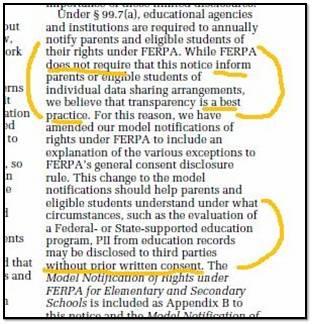The only changes I've made are formatting changes to make it more easily readable.
What Is Common Core?
This post aims to be as unmistakably direct and documented as possible. Feel free to use it without asking permission.
DOES COMMON CORE PREPARE STUDENTS FOR COLLEGE?
Not for a 4-year university. It minimally prepares
students for the non-collegiate workforce or for non-selective community
colleges.
A key
Common Core creator, Jason Zimba,
said that the Common Core can prepare students for non-selective colleges but that
it does not prepare students for STEM careers. He said: “
I think it’s a fair critique that it’s a minimal definition of college readiness… but not for the colleges most parents aspire to… Not only not for STEM,
it’s also not for selective colleges. For example, for U.C. Berkeley,
whether you are going to be an engineer or not, you’d better have
precalculus to get into U.C. Berkeley.”
IS THERE AN AMENDMENT PROCESS FOR VOTERS TO ALTER THE COMMON CORE?
No. When it changes, it will be changed by those who wrote them. (See
official site .)
ARE COMMON CORE STANDARDS LOCALLY CONTROLLED?
No. They are under
copyright by an unelected, private D.C. group called NGA/CCSSO which
has reserved the legal right to alter them. The federal government has
made money and waivers conditional on using Common Core standards and
tests.


DO THE COMMON CORE STANDARDS IMPROVE K-12 EDUCATION?
No one knows. They are an unpiloted experiment. But people who are financially invested in Common Core
say yes to the question, while people who aren’t financially interested, and who study and analyze the Common Core standards,
say no.
Dr. James Milgram (Stanford University emeritus professor who served on the official Common Core validation committee) reported:
“
I can tell you that my main objection to Core Standards, and
the reason I didn’t sign off on them was that they did not match up to
international expectations.
They were at least 2 years behind the practices in the high achieving countries by 7th grade, and, as a number of people have observed,
only require partial understanding of what would be the content of a normal, solid, course in Algebra I or Geometry.
Moreover, they cover very little of the content of Algebra II, and none of any higher level course… They
will not help our children match up to the students in the top foreign
countries when it comes to being hired to top level jobs."
Dr. Sandra Stotsky
(University of Arkansas emeritus professor who served on official
Common Core validation committee and also refused to sign off on the
academic legitimacy of the Common Core) said:
“
As empty skill sets, Common Core’s ELA standards do not
strengthen the high school curriculum. Nor can they reduce
post-secondary remedial coursework in a legitimate way. As empty skill
sets, Common Core’s ELA “college readiness”
standards weaken the base of literary and cultural knowledge needed for authentic college coursework,
decrease the capacity for analytical thinking…
and completely muddle the development of writing skills.”
Full testimony here.
IS COMMON CORE LEGAL?
No. Under the Constitution, education belongs to
individual states. It is illegal for the federal government to
interfere in the states’ right of making educational decisions.
National standards are illegal. National data collection is illegal.
And the General Educational Provisions Act prohibits the federal
government from directing education –very, very clearly:
“
No provision of any applicable program shall be construed to
authorize any department, agency, officer, or employee of the United
States to exercise any direction, supervision, or control over the
curriculum, program of instruction, administration, or personnel of any
educational institution, school, or school system, or over the
selection of library resources, textbooks, or other printed or published
instructional materials by any educational institution or school
system…“
DOES COMMON CORE REALLY TAKE AWAY MOST OF THE TRADITIONAL CLASSIC LITERATURE AND NARRATIVE WRITING?
Yes. Although it does not specify which classic
books cannot be read, the Common Core contains a chart that explains
that in fourth grade, students
must cut their classic/fiction reading to 50%. By twelfth grade, students
must reduce their classic/fiction reading to 30% with
informational text taking up 70% of the time spent reading.
| Grade |
Literary |
Information |
| 4 |
50% |
50% |
| 8 |
45% |
55% |
| 12 |
30% |
70% | | | |
WHAT IS INFORMATIONAL TEXT?
Informational text is anything that used to belong mostly in other subjects. It is now taking
70% of high school seniors’ English class readings, in the form of scientific writings, political writings; opinion pieces; almost
anything other than classic novels, poetry, plays or other fictional works.
WHY DON’T COMMON CORE PROPONENTS WANT STUDENTS TO LEARN MUCH MATH?
It costs money to educate beyond minimal workforce training. In
this 2013 document put out by the NCEE (
National Center on Education and the Economy)
we learn that it’s not important under Common Core to have high
educational standards in high school; it’s seen as a waste of time to
educate the high school graduates past Algebra II.
They’re pushing for an emphasis on the lowest common denominator, while
deceptively marketing Common Core as a push for “rigorous” academics.
Read these Common Core proponents’ lips:
“Mastery
of Algebra II is widely thought to be a prerequisite for success in
college and careers. Our research shows that that is not so… Based on
our data, one cannot make the case that high school graduates must be
proficient in Algebra II to be ready for college and careers. The high
school mathematics curriculum is now centered on the teaching of a
sequence of courses leading to calculus that includes Geometry, Algebra
II, Pre-Calculus and Calculus. However, fewer than five percent of
American workers and an even smaller percentage of community college
students will ever need to master the courses in this sequence in their
college or in the workplace… they should not be required courses in our
high schools. To require these courses in high school is to deny to many
students the opportunity to graduate high school because they have not
mastered a sequence of mathematics courses they will never need. In the
face of these findings, the policy of requiring a passing score on an
Algebra II exam for high school graduation simply cannot be justified.”
The report goes on to say that traditional high school English
classes, with their emphasis on classic literature and personal,
narrative writing, is useless. The report says that Common Core will
save students from the irrelevant classics with a new emphasis on
technical subjects and social studies via the dominance of informational
text:
“
The Common Core State Standards in English Language Arts (CCSSE) address reading in history/social studies as well as science and technical subjects, and in so doing may increase the relevance of high school instruction.”
In calling classic literature and personal writing irrelevant, these
Common Core proponents underscore the idea that job prep matters, but
not the pursuit of wisdom or knowledge.
WHY DID ALMOST EVERY STATE IN THE U.S. DROP THEIR EDUCATIONAL STANDARDS, WHETHER LOWER OR HIGHER, TO ADOPT COMMON CORE STANDARDS?
Proponents say that the reason was to improve education.
Opponents say that
it had nothing to do with education; that the standards were adopted
without analysis or any vetting because the adoption was offered by the
federal government under time pressure, in exchange for a chance at
large federal grant monies called
Race to the Top. Even those states that applied and won no money (like Utah) stayed with Common Core, because there were many
other federal reasons and incentives to do so.
WILL THE COMMON CORE STANDARDS REMAIN AS THEY ARE TODAY?
No. Common Core’s
official site says: “The Standards are intended to be
a living work:
as new and better evidence emerges, the Standards will be revised
accordingly.” There’s no way for the governed to revise the document by
which they’ve agreed to be governed.
WHY DOES THE STATE SCHOOL BOARD SAY WE’RE FREE TO CHANGE THEM?
States can’t delete anything. We can add –a tiny bit. A Common Core
15% rule says: ”
A State may supplement such standards with additional standards, provided that the additional standards do not exceed 15 percent of the State’s total standards”
(
This rule is repeated in the federal waivers from No Child Left
Behind, in the Race to the Top Assessments Grant application,
in documents of both PARCC and SBAC testing groups, and in the
implementation guide of Achieve, the group contracted to create Common
Core.)
WILL THE CREATORS OF COMMON CORE CHANGE THESE STANDARDS WITHOUT OUR APPROVAL?
Yes. Common Core’s
official site says: “The Standards are intended to be
a living work:
as new and better evidence emerges, the Standards will be revised
accordingly.” There’s no invitation for the governed to revise.
WHERE DO PROPONENTS GET THE NOTION THAT COMMON CORE WILL IMPROVE EDUCATION?
From believable, expensive marketing lines. Not from evidence.
Opponents point out that there
was never any field testing
for Common Core standards; so this is a national experiment using
virtually all children. Supporters never attempt to explain
how education
is supposedly improved by Common Core, nor show a pilot state or pilot
classroom where Common Core had been successfully used. Beyond the
many
pleasant-sounding and but words, there is
no documentation or evidence to back up any of the
claims that the standards are higher, nor the other claims such as “Common Core was
internationally benchmarked” or “
is rigorous” or “
improves college and career readiness.” They are baseless advertising words.
Upon this lack of evidence we build our children’s futures.
ARE COMMON CORE STANDARDS FREE TO US?
No. The standards’ development and marketing was
paid for primarily by Bill Gates. The Common Core tests for most states was
paid for primarily by the federal government. States pay countless millions for the rest of the Common Core Initiative: the re-training, new text purchases, aligned computer technologies, etc. They
incorrectly say that these high costs would have been spent anyway, even without Common Core.
WAS THE FEDERAL GOVERNMENT “HANDS-OFF” THE STATES’ ADOPTION OF COMMON CORE?
No. Secretary Duncan
announced and praised the release of the standards in 2010. He bribed states using Race to the Top grant money. He
contracted with the testing groups to micromanage the Common Core tests, in exchange for federal grant money.
DID THE FEDERAL GOVERNMENT BRIBE STATES TO ADOPT COMMON CORE?
Yes. States received federal ARRA money to implement
pre-common core reforms that paved the way for Common Core, including building a
State Longitudinal Database System. There were
4 federal key objectives for education reforms laid out by President Obama which were the four conditions for receiving stimulus monies.
Federally defined common standards and tests were one of the conditions.
More evidence of bribery and coercion can be seen in the timing of a majority of the states’ adopting Common Core
simultaneously with the Race to the Top money lure. And recently, a group of
U.S.
Senators have denounced what the Executive Branch (Obama
Administration) has done in coercing states with Common Core bribes.
IS COMMON CORE RELATED TO STUDENT DATA MINING?
Yes. But Secretary
Arne Duncan told the American Society of News Editors that
opponents
make “outlandish claims. They say that the Common Core calls for
federal collection of student data. For the record, we are not allowed
to, and we won’t.”
He just told a bold-faced lie. The
federal Edfacts Exchange collects data for local, state and federal levels. The federal government
paid for the states to build matching and interoperable
State Longitudinal Database Systems. The White House hosts
Datapalooza where Common Core and common data standards are spoken of warmly and together.
The Department of Education is listed as a
partner at the EIMAC (Education Information Management Advisory Consortia) There are many other
things that the Department of Education has done to take away student privacy, aiming aims to align common data standards with common educational standards.
WHAT SPECIFICALLY DID THE DEPARTMENT OF EDUCATION DO TO REMOVE PRIVACY FROM STUDENT DATA?
– It bribed the states with ARRA Stimulus monies to build 50 linkable, twinlike
State Longitudinal Database Systems (SLDS). This created a virtual national database.
– It altered the (previously privacy-protective) federal FERPA
(Family Educational Rights Privacy Act) law to make access to personally
identifiable student data –including biological and behavioral data–
“legal”. Now, the act of requiring parental consent (to share
personally identifiable information) has been
reduced from a requirement to just a “best practice” according to the altered federal FERPA regulations.
For more information on this, study the
lawsuit between the Electronic Information Privacy Center and the Department of Education.
– The US Department of Education
partnered with private groups, including the
Data Quality Campaign and the CCSSO (that’s the Council of Chief State School Officers –
copyright holders on Common Core–)
to collect student data nationally.
IS THIS ABOUT MAKING MONEY AT THE EXPENSE OF QUALITY EDUCATION?
Yes. Educational gains are not the motivator for Common Core. Notice that proponents are either
financially invested in
the implementation of Common Core, or else must be subservient to
it and call it good because they rely on payment from those who are
invested. The financial obligation should make the following groups’
promotion of Common Core extremely suspect:
Bill and Melinda Gates Foundation -
Microsoft –
Pearson Education -
National PTA -
Jeb Bush -
Harvard University -
National Governors’ Association -
Council of Chief State School Officers - Fordham Institute – Manhattan Institute – Exxon, and many, many more.
IS COMMON CORE RESPECTED BY HIGHER ED?
132 professors of Catholic Universities recently wrote
a letter denouncing Common Core on both academic and moral grounds.
Also:
Dr. Anthony Esolen of Providence College in Rhode Island has written:
“What appalls me most about the standards … is the cavalier contempt
for great works of human art and thought, in literary form. It is a
sheer ignorance of the life of the imagination. We are not programming
machines. We are teaching children. We are not producing functionaries,
factory-like. We are to be forming the minds and hearts of men and
women… to be human beings, honoring what is good and right and
cherishing what is beautiful.”
Dr. Thomas Newkirk of University of New Hampshire has written:
The standards are portrayed as so consensual, so universally
endorsed, so thoroughly researched and vetted, so self-evidently
necessary to economic progress, so broadly representative of beliefs in
the educational community—that they cease to be even debatable… The
principle of opportunity costs prompts us to ask: “What conversations
won’t we be having?” Since the CCSS virtually ignore poetry, will we
cease to speak about it? What about character education, service
learning? What about fiction writing in the upper high school grades?
What about the arts that are not amenable to standardized testing? … We
lose opportunities when we cease to discuss these issues and allow the
CCSS to completely set the agenda, when the only map is the one it
creates.”
Dr. Daniel Coupland of Hillsdale College has written:
“Yes, man is made for work, but he’s also made for so much more…
Education should be about the highest things. We should study these
things of the stars, plant cells, Mozart’s Requiem… not simply because
they’ll get us into the right college or into the right line of work.
Rather, we should study these noble things because they can tell us who
we are, why we’re here… If education has become –as Common Core openly
declares– preparation for work in a global economy, then this situation
is far worse than Common Core critics ever anticipated. And the concerns
about cost, and quality, and yes, even the constitutionality of Common
Core, pale in comparison to the concerns for the hearts, minds, and
souls of American children.”
Dr. Christopher Tienken of Seton Hall University has written:
“Education reform in the United States is being driven largely by
ideology, rhetoric, and dogma instead of evidence…. Where is the
evidence of the efficacy of the standards? … Let us be very frank: The
CCSS are no improvement over the current set of state standards. The
CCSS are simply another set of lists of performance objectives.” Dr.
Tienken also has two powerful short videos on the subject of
standards and of
assessments.
Dr. Alan Manning of Brigham Young University has written:
“The Core standards just set in concrete approaches to
reading/writing that we already know don’t work very well. Having the
Core standards set in concrete means that any attempts to innovate and
improve reading/writing instruction will certainly be crushed. Actual
learning outcomes will stagnate at best. An argument can be made that
any improvement in reading/writing instruction should include more
rather than less attention the reading/analysis of stories known to
effective in terms of structure (i.e. “classic” time-tested stories). An
argument can be made that any improvement in reading/writing
instruction should include more rather than fewer exercises where
students write stories themselves that are modeled on the classics. This
creates a more stable foundation on which students can build skills for
other kinds of writing. The Core standards would prevent public schools
from testing these kinds of approaches.”
Dr. Bill Evers of Hoover Institute at Stanford University noted:
“The Common Core — effectively national math and English curriculum
standards coming soon to a school near you — is supposed to be a new,
higher bar that will take the United States from the academic doldrums
to international dominance.
So why is there so much unhappiness about it? There didn’t seem to be
much just three years ago. Back then, state school boards and governors
were sprinting to adopt the Core. In practically the blink of an eye,
45 states had signed on.
But
states weren’t leaping because they couldn’t resist the Core’s academic magnetism. They
were leaping because it was the Great Recession — and the Obama
administration was dangling a $4.35 billion Race to the Top carrot in
front of them. Big points in that federal program were
awarded for adopting the Core, so, with little public debate, most did.”
Dr. Terrence Moore of Hillsdale College has written:
“Literature is the study of human nature. If we dissect it in this meaningless way, kids not only
do not become college and career ready,
they don’t even have a love of learning; they don’t even have an understanding of their fellow men…
The thing that bothers me more than anything else is found on page
number one of the introduction. That says that Common Core is a living
work.
That means that the thing that you vote on today could be
something different tomorrow, and five years from now it is completely
unrecognizable.” (Dr. Moore also wrote
a most excellent book about Common Core English standards, entitled “The Storykillers.”)
Dr. Sandra Stotky (spoken of at the top) has written:
“The wisest move all states could make to ensure that students learn
to read, understand, and use the English language appropriately before
they graduate from high school is first to abandon Common Core’s
‘standards’…”
“The notion that Common Core’s college and career readiness standards
are “rigorous” needs to be publicly put to bed by Arne Duncan, his
friends at the Fordham Institute and the media. Two of Common Core’s own
mathematics standards writers have publicly stated how weak Common
Core’s college readiness mathematics standards are. At a public meeting
of the Massachusetts Board of Elementary and Secondary Education in
March 2010, physics professor Jason Zimba said, “The concept of college
readiness is minimal and focuses on non-selective colleges.”
Dr. Stotsky also testified that:
“Beyond the lack of clarity from the outset about what college
readiness was intended to mean and for whom, Common Core has yet to
provide a solid evidentiary base for its
minimalist conceptualization of college readiness–and for equating college readiness with career readiness. Moreover… it had no evidence on both issues.”
“Common Core supporters still can’t figure out how to deal with
legitimate criticisms of its English language arts (ELA) standards. So
they just keep parroting the line that Common Core’s ELA skills are
actually standards, are rigorous and prioritize literary study, when
it’s quite obvious to any English teacher that they are none of the
above.”
“Common Core was/is not about high-quality national education
standards. It was/is not about getting low-income, high-achieving
students into advanced math and science courses in high school and then
into college. CCSSI was and is about how to lower the academic level of
what states require for high school diplomas and for admission to public
colleges.”
“Of course, Common Core proponents can’t say that lowering academic
standards is their goal. Instead, they claim that its standards will
reduce the seemingly terrible problems we have with interstate mobility
(actually less than 2 percent nationally) or enable Massachusetts
teachers to know how Mississippi students compare to theirs (something
they never said they were eager to learn), or facilitate nationally the
sale of high-tech products to the public schools (something the P-21
skills folks were eager for). They have looked desperately for
motivating issues and these are the best cards in their deck, as poor as
they are.”
“Their major selling point is how poor our K-12 public education system is in too many states.
But it needs to be strengthened, not weakened. We continue to need capable doctors and engineers who build bridges and tunnels that won’t collapse.”
“Are we as a society really ready to agree to Common Core’s
low-expectations for college readiness (as professors Zimba and McCallum
indicate)? Are we willing to lower the bar as a way of closing the
achievement gap?”
“We hear no proponents or endorsers of Common Core’s standards
warning this country about the effects of the college-readiness level in
Common Core’s mathematics standards on postsecondary and
post-baccalaureate academic and professional programs. We hear no
proponents or endorsers of Common Core’s standards advising district
superintendents and state education policy makers on the kind of
mathematics curriculum and courses they need to make available in our
secondary schools if our undergraduate engineering colleges are to
enroll American students. At this time we can only conclude that a
gigantic fraud has been perpetrated on this country, in particular on
parents in this country, by those developing, promoting, or endorsing
Common Core’s standards. We have no illusion that the college-readiness
level in ELA will be any more demanding than Common Core’s
college-readiness level in mathematics.” – Sept. 2013 paper:
Can This Country Survive Common Core’s College Readiness Level? by R. James Milgram and Sandra Stotsky
Dr. William Mathis, of the University of Colorado, has written:
“The adoption of a set of standards and assessments, by themselves,
is unlikely to improve learning, increase test scores, or close the
achievement gap. • For schools and districts with weak or non-existent
curriculum articulation, the CCSS may adequately serve as a basic
curriculum. • The assessment consortia are currently focused on
mathematics and English/language arts. Schools, districts, and states
must take proactive steps to protect other vital purposes of education
such as citizenship, the arts, and maximizing individual talents – as
well as the sciences and social sciences. As testbased penalties have
increased, the instructional attention given to non-tested areas has
decreased. • Educators and policymakers need to be aware of the
significant costs in instructional materials, training and computerized
testing platforms the CCSS requires. It is unlikely the federal or state
governments will adequately cover these costs. • The nation’s
“international economic competitiveness” is unlikely to be affected by
the presence or absence of national standards.”

———————-
Parents and retired teachers, it is up to us to stop this
thing. Teachers who are currently teaching, or principals, or others
who work in the education sales industry dare not speak up too loudly or
risk losing their jobs. It is up to us.















